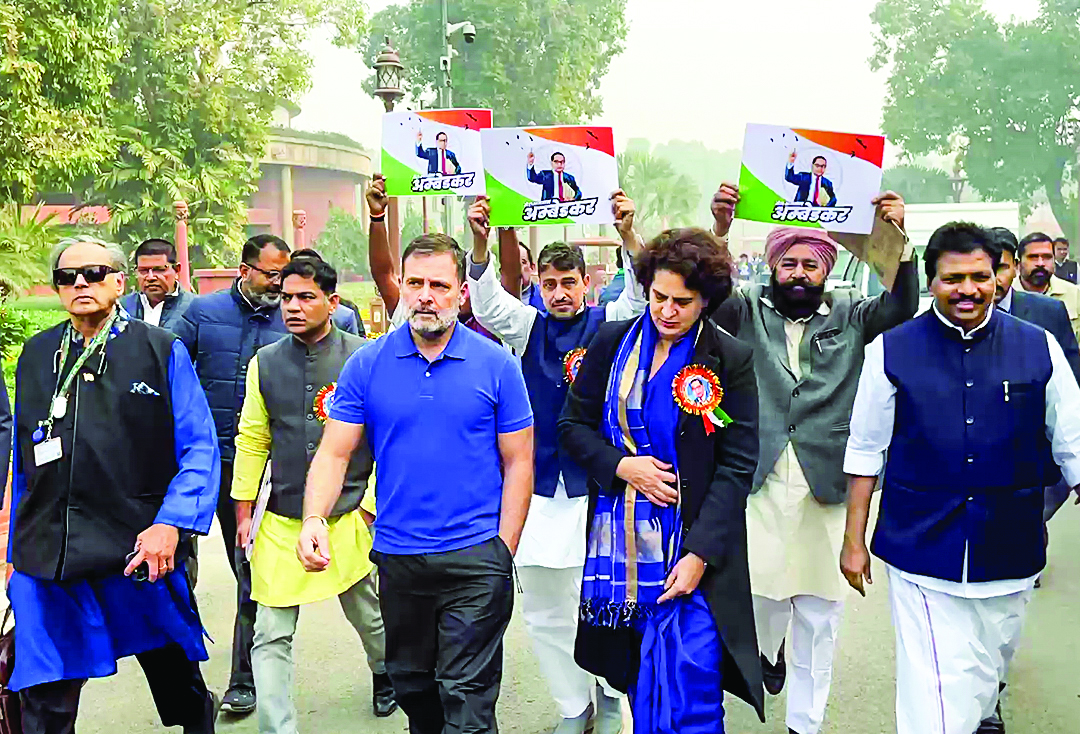Congress seems to believe criticising Adani and focus on threat to constitution engages public interest.
New Delhi: The ways certain events unfold are not just surprising but also leave the entire country thinking. This time what the parliament witnessed during winter session is a testament to this.
In the past two weeks, the opposition focused only topics like ‘Adani’ and ‘caste politics’ and again failed to raise any significant issues concerning the common people that could spark a mass movement against the central government. Congress in particular believes that raising concerns about top industrialist’s, Adani’s alleged malpractices and claiming that the ‘Constitution is under threat’ is a good strategy to garner public interest?
This is evident when they reacted strongly to Union Home Minister Amit Shah mentioning Father of Indian constitution, BR Ambedkar three to four times in his closing speech, treating it as a major political opportunity. Following this, Congress began adopting slogans like “Jai Bhim,” commonly associated with regional parties in Uttar Pradesh. MP Priyanka Gandhi even started using the rhetoric and style of these regional parties, which raised eyebrows since Congress is a national party.
Leaders like Mayawati, Akhilesh Yadav, and Chandrashekhar Azad are unlikely to let Congress encroach on their regional voter base. Instead, they criticise Congress, making it clear that they wouldn’t support such moves.
The Samajwadi Party (SP) has been focusing its politics on PDA—an alliance of backward classes, Dalits, and minorities, particularly Muslims. SP’s support played a key role in helping Congress save face during the last Lok Sabha elections. However, if Congress tries to encroach on SP’s PDA vote base, SP is likely to distance itself from the party, and signs of such a rift were already visible during the recent winter session. The Azad Samaj Party and Bahujan Samaj Party (BSP) are already estranged from the I.N.D.I. Alliance, leaving Congress vulnerable and isolated in the politics of backward classes.
Congress has also lost the trust of upper castes due to its shift toward caste-based politics. Its strategists now realize that the Bharatiya Janata Party’s (BJP) consolidated Hindu voter base must be divided to make a comeback. However, Congress struggles to compete with regional parties like SP, Rashtriya Janata Dal (RJD), Bahujan Samaj Party, or other local players on caste-based issues. Appealing to the upper castes might be Congress’s only hope to strengthen its position within the I.N.D.I. Alliance.
The opposition wasted the first two weeks of the winter session largely because of Congress’s singular focus on industrialist Gautam Adani. Rahul Gandhi has been steadfast in his belief that the Adani issue is a winning strategy, even though it has failed to yield electoral success over the past three years. Despite linking Adani to issues like Mumbai’s Dharavi redevelopment during the Maharashtra elections, the issue did not resonate with voters. This raises doubts about its effectiveness at a national level.
When Rahul insisted on keeping the Adani issue at the forefront, it caused friction within the opposition. Some allies distanced themselves and questioned Congress’s leadership within the I.N.D.I. Alliance. Faced with mounting criticism, Rahul eventually retreated from his stance.
Congress’s national president, Mallikarjun Kharge, though experienced and politically astute, has focused more on pleasing the Gandhi family than pursuing impactful issue-based politics. His leadership has been marked by a lack of decisive action, as seen during the winter session.
One notable misstep was the no-confidence motion against the Chairman in the Rajya Sabha. Past opposition leaders like Manmohan Singh and Ghulam Nabi Azad navigated parliamentary politics with dignity, avoiding such extreme confrontations.
In contrast, the current opposition’s disruptive tactics have neither pressured the government nor benefited them politically. By stalling parliamentary proceedings for the past three to four years, the opposition has failed to achieve significant outcomes.
The chaotic scenes during the winter session underscored this lack of strategy. The opposition’s overreaction to a statement by Union Home Minister Amit Shah during the final week tarnished parliamentary dignity. The scuffles and confrontations between the opposition and the government reached an unprecedented low, with the Lok Sabha witnessing its first-ever assault case filed against Rahul Gandhi.
Congress finds itself in a weakened position, lacking both the organisation and momentum to mobilise a mass movement. The Adani issue, though repeatedly emphasised by Rahul, does not resonate as a concern for the common man, leaving the party without a compelling agenda. Furthermore, Congress workers lack the morale and confidence that comes from believing their party can win elections. Without this optimism, building a movement becomes even more challenging.
The recent session also exposed Congress’s fragile relationships within the I.N.D.I. Alliance. In the assault case against Rahul Gandhi, the party received little support from its allies, highlighting its isolation. The opposition’s focus on disrupting Parliament rather than engaging in substantive debates has backfired, giving the government an opportunity to avoid addressing issues of public concern.
Overall, Congress’s current strategy seems ineffective and misaligned with ground realities.
Congress will have to understand in these circumstances that the more it promotes caste politics, the more BJP will sharpen the issue of Hindutva. The opposition has no answer to the issue of Hindutva.

